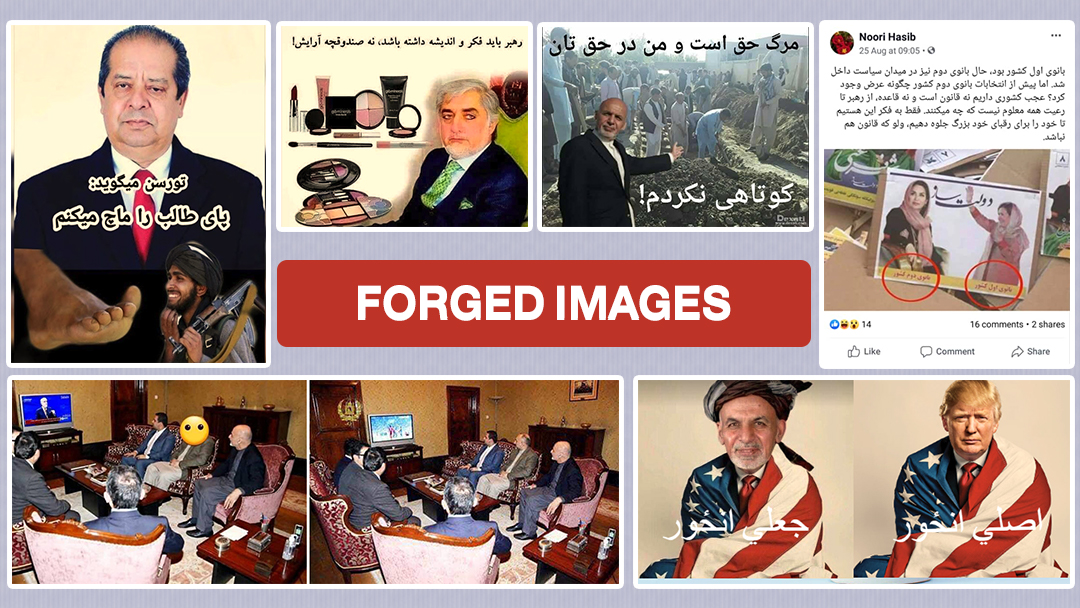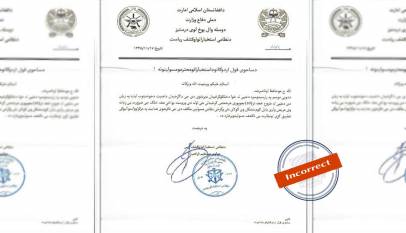Forged images bring angst to electioneering
KABUL (Pajhwok): Political experts have called for stopping the release of photo shopped images on social media (Facebook and Twitter) defaming presidential candidates.
But the Independent Election Complains Commission (IECC) and the Ministry of Telecommunications and Information and Technology (MoTIT) say controlling all social media pages is difficult.
The existence of fake pages has worsened the problem. In case of a formal complaint, the commission and the ministry say, they will take necessary legal steps.
Some people, however, release photo shopped images and false reports against candidates to defame them and impede their success at the polls.
One of these is President Ashraf Ghani’s photo which shows him draping himself in an American flag. In reality, it is the photo of US President Donald Trump.
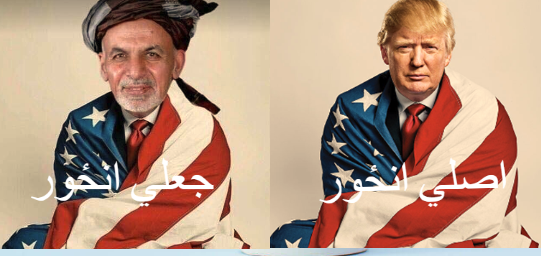
A similar picture of presidential candidate Mohammad Hakim Torsan has also been posted on social media. Though this photo has not been tampered with, yet the caption reads: “Torsan says: I kiss Taliban’s feet.”
Torsan told Pajhwok Afghan News he had never uttered the words. “I believe in Allah, and will kiss the hands and feet of the people who serve their people and country.”
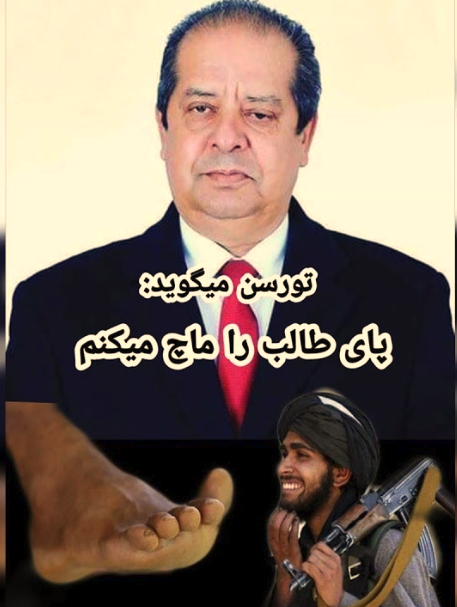
In September 18, Pajhwok published a report regarding photo-shopped photo of Ghani and Dr. Abdullah Abdulla. Supporters of the two leaders traded barbs on social media over the photos.
Ghani and Abdullah were expected to have a live debate on Ariana Television on Monday evening. But at the last minute, Ghani refused to participate in the discussion.
As the program started, host Nasir Fayyaz said: “Ashraf Ghani would not show up and only Abdullah would respond to my questions.”
The TV channel said Ghani had agreed to participate in the debate. Until the last moment, his team members were present there.
After Ghani refused to participate in the debate and Abdullah answered the host’s questions, supporters of the CEO published on social media a forged photo of Ghani watching his rival on the TV screen.
Later, supporters of Ashraf Ghani found the original photo and published it on Facebook pages that Ghani is watching a football match with others.
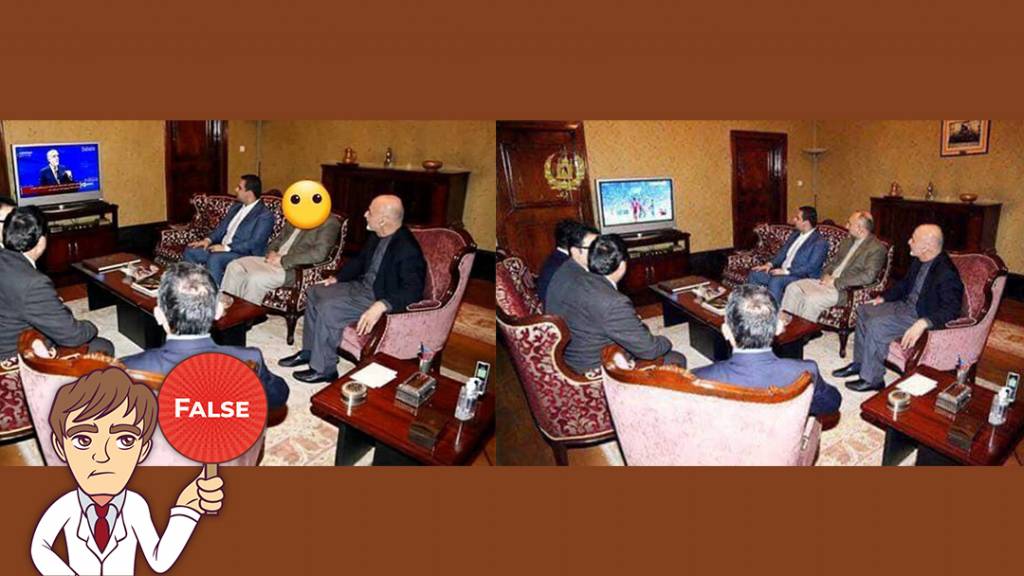
A photo-shopped picture of another candidate, Dr. Abdullah Abdullah, was also recently circulated on social media pages.
Pajhwok did not find the original picture of Abdullah, but it is obvious the photo was forged and make-up tools added to it in a fraudulent manner. Besides photo-shopped images, some people have created fake social media pages in the name of candidates.
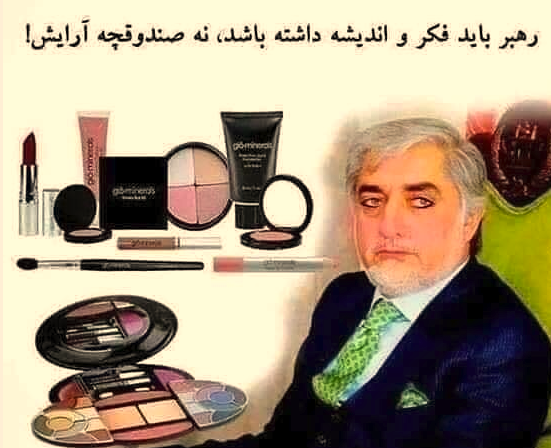
Bad conduct of campaigns
Political analyst Akbar Jan Folad said it was happening because many Afghans had not yet reconciled to the culture of democracy in the country.
He added: “But, unfortunately, they don’t know what the elections are all about. Elections are conducted to choose the right person and make our intentions clear…”
According to Folad, some of the pages with inaccurate materials might have been created by intelligence networks of neighbouring countries to fan differences among the Afghans.
Negative impact
Folad said: “These activities definitely have a negative effect on the election process; they tend to destroy the culture of mutual respect and lead to confrontations. This districts attention from the country’s development.”
Campaigns based on wrong approaches or blame game also affected people’s participation in the election because voters thought candidates bickering with one another would not be able to serve them, he reasoned.
Mohammad Reza Fayyaz, IECC’s deputy spokesman, said photo-shopping and releasing such pictures on social media caused a negative impact on the election process. The practice damaged the reputation of candidates, he explained.
“It is morally incorrect and may stop people from voting for the candidate of their choice,” he said.
How to check online defamation
Folad said candidates should advise their campaign organisers not to insult others and explain the consequences of defamation.
People should avoid making statements and speeches that insulted others, he added. “People should tell campaigners they are not here to insult others; they are here to highlight their programmes.”
In addition to that, the IEC should have prepared plans for stopping hate speech besides formulating rules and regulations in this regard, Folad suggested.
Mohammad Reza Fayyaz, the IECC deputy spokesman, said: “Propaganda on fake social media accounts is a challenge to us. When accounts are faked, controlling people behind them is also difficult.”
However, he urged the public to report fake account holders spreading propaganda to the IECC. The commission would take action. No complaints have been registered yet with the IECC.
Fake photos of candidates and insults against them are mostly posted on social media networks, particularly Facebook.
Shershah Nawabi, advisor to the Ministry of Communications and Information Technology (MCIT), said they had created the Cyber Security Department to identify social media account holders who insulted people.
“If an election candidate complains of being insulted ny a social media user, the complaint is tracked and the suspect referred to judicial and security organs,” he said.
However, he added if a candidate did not complain, the ministry would not close social media accounts. The main problem is that most of fake photos are published on fake Facebook accounts.
Nawabi said public cooperation was important for the success of efforts at controlling hate speech and keeping a check on 3.2 million Facebook users was not an easy job.
Ahmad Shah Erfanyar
Hits: 8006
Letter regarding ban on roaming during night is fake
KABUL (Pajhwok): The Ministry of Defence (MoD) and an expert have rejected the letter rega…
